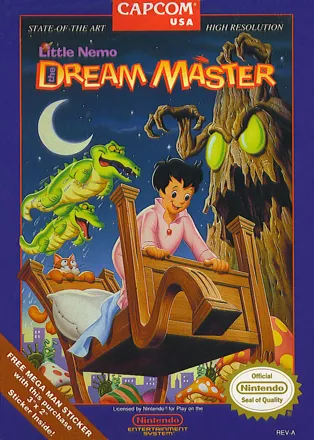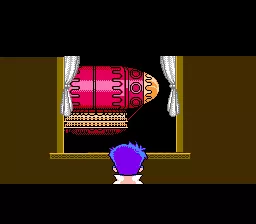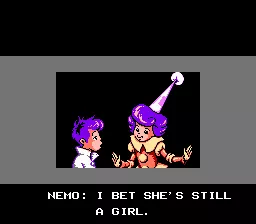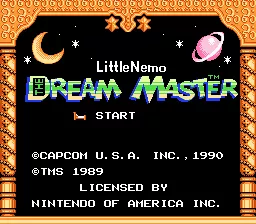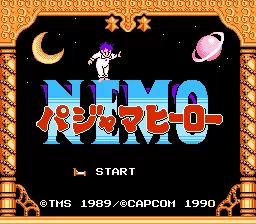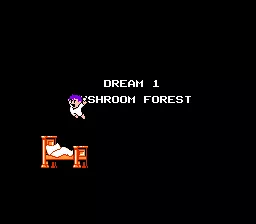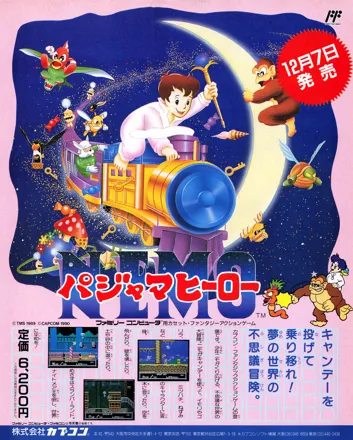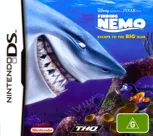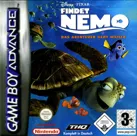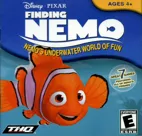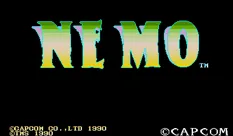Little Nemo: The Dream Master
Description official description
Based on a comic strip from the 1900s, Nemo is a young boy from London summoned to the kingdom of Slumberland, a fantasy realm filled with strange creatures and dream-like locations. You soon learn that the King of Slumberland has been kidnapped by the Prince of Nightmares, and you are requested to save him by Princess Camille. Using your only weapon, a sack of candy, you stun enemies and lull friendly animals into helping you through levels like the Mushroom Forest and Train Land. This platformer featured licensed characters and artwork from the comic, along with using the animals, such as apes and moles, to traverse through the different terrain.
Spellings
- パジャマヒーロー NEMO - Japanese spelling
Groups +
Screenshots
Promos
Credits (NES version)
12 People (11 developers, 1 thanks)
| Game Designer |
|
| Character designer |
|
| Music Composer |
|
| Programmer |
|
| Exective producer |
|
| Special thanks | |
| Presented by |
|
Reviews
Critics
Average score: 80% (based on 18 ratings)
Players
Average score: 3.8 out of 5 (based on 33 ratings with 3 reviews)
With the help of Little Nemo, we learn the many dastardly uses of candy.
The Good
Little Nemo is the kind of game that reminds me of how easy the younger gamers have it these days. This will probably make me sound like an old gamer, but back in my day, games designed with the kiddies in mind weren’t any easier than the ones made for the big kids. Back in the day, we used to play the same games as the adults. Oh sure, we didn’t play them well, and we certainly died a lot more, but that’s how we learned. Little Nemo: The Dream Master is a shining example of that. This game is extremely difficult, but it’s obviously aimed at a younger audience. Don’t try to argue otherwise, kids are the only people who are too naïve to see the horrors this game depicts.
In fact, this game terrifies me. The object of the game is to run around, trying to accumulate enough keys to open the door at the end of each level. To do this, Nemo must lull specific animals to sleep using drugged candy. Once they’re asleep, Nemo then has the ability to wear the animal like a skin. I’m not joking. Nemo gets inside of them and continues on wearing the unfortunate creature. This is especially gruesome when using the mole, as the top of the poor animal’s head is bent back like some sort of grim hood. Oh sure, sometimes Nemo will just ride on top of the animal, but regardless of how he chooses to command them, they always explode when he’s done. Yeah, sick twisted stuff.
Apparently this grotesque mess is based off an old comic strip that dates back to the early 1900’s as well as some movie I’ve never heard of from Japan. Luckily for people like myself who have never heard of these things, there is a storyline told through cutscenes. Apparently the Princess of Slumberland wants Nemo to be her playmate, but really it’s a ruse to trick him into defeating the nightmare master. That sounds like kidnapping to me, which is made complete when Nemo is baited into compliance with candy. However, like I mentioned earlier, from a child’s perspective, the storyline is completely innocent. It’s a charming enough storyline and it stays out of the way like every good 8-bit tale should.
There are eight dreams that you must traverse with a lot of variety sprinkled in. A few of the levels even discard the whole key gathering aspect altogether, so it’s really quite refreshing. One level you’re on a toy train, in another you’re in an upside-down house, and in another you swim with the hermit crabs. All of the levels are fairly convincing dreamscapes. Within each level, the game is a fairly standard platformer. Nemo is harmless on his own, but there are many different animals to mutilate, each with their own unique abilities. The mole digs, the bee flies, and the mouse climbs walls and provides you with a hammer for some reason.
Little Nemo’s graphics are excellent. Not entirely surprising given that the game was released in 1990, and was made by Capcom. Still, the graphics are quite colourful, which is something sort of difficult to pull off, considering the NES only had a pallet of 64 colours, most of them black. What really pops, however, is the music. While not the best music on the console, Little Nemo’s soundtrack gets the job done from start to finish. My favourite track from the game is from the topsy-turvy level. It has a sort of circus-like accordion sound to it, which is very surreal and pleasing.
The Bad
There’s a fine line between difficult and frustrating and Little Nemo straddles it like a stripper’s pole. Overall, the challenge is right where it should be, but small adjustments should have been made to tone down the frustration factor. For one, the checkpoint system is screwed all to hell. Not only can you reactivate previous checkpoints if you backtrack too much, but some levels don’t have checkpoints at all. The fifth level is the biggest offender. Here you must procure a frog to reach a lizard which enables you to get a bee and finally a mouse. Should you die after you hop on the mouse, you’re kicked right back to the beginning of the level to do the whole damned thing again. What makes this even more frustrating is knowing that level 2 did a similar progression with switching animal suits. However, if you died before reaching the end of the level, you were only sent back a short distance. Why couldn’t they do this again for the fifth level?
It’s common for spikes to kill an 8-bit character instantly, but Capcom was a bit too clumsy with their placement in Little Nemo. There are a few areas where precise hopping is required to avoid spikes on the ceilings, but their placement results in a lot of instances in which Nemo will gently brush the side of one, which kills him instantly. Barrier placement should have been used to prevent Nemo from being killed by something less concerning than a paper-cut. It’s also sometimes difficult to tell what exactly is considered to be spikes. There are these weird fence things in the Sky Ruins level that I thought were merely part of the background until one killed me. To be fair, Little Nemo isn’t the only game that this problem exists in, but that doesn’t make it any more forgivable.
There are infinite continues, which is a good thing because I’m not sure I’d have the patience to finish the game otherwise. However, there is no password system. What gives? Some of the later levels are obnoxiously frustrating, but if you quit, you lose all of your progress. So basically it’s all or nothing and if you want to toss the controller and turn off the console, you’re going to have to start over. There is a level select cheat that you can use, but I’m not going to give the game any points for it because it wasn’t mentioned in the instruction booklet.
There are a lot of small nuisances that should have been cleaned up. I think the strangest one is that the animals you can pilot will hurt you unless you drug them first. Not only that, if they’re in the process of chewing the tranquilizer, they’ll still hurt you. This isn’t a huge problem, but it is extremely vexing when you’re on your last bar of health and you get taken out by an animal who is only dangerous because he hasn’t yet swallowed. There are also enemies that resemble floater seeds, which are nothing more than pester enemies. They track you from the top of the screen and then descend on you. What’s really annoying about them is that if you kill them, they immediately spawn from the top of screen. It’s easier just to let them fly by, since it will take them longer to spawn.
The Bottom Line
I can’t exactly say that Little Nemo won me over. A needlessly frustrating game isn’t going to win any friends, after all. However, it is an undeniably tight game. Aside from the frustration factor, it’s difficult to poke holes in it. It has its memorable moments, the music is top notch, and the design is relatively sound. Plus, the plot and premise are charming in a childish sort of way. So did I enjoy the game? Mostly. I don’t know. I just couldn’t really get into it. Do I recommend it? Certainly! You could do a lot worse on the NES. Little Nemo: Dream Master is an OKAY game.
NES · by Adzuken (836) · 2010
The Good
Gamers of a certain age, will have many fond memories of the library of 8-bit games by Capcom. From original titles such as Mega Man to the excellent titles based upon popular cartoon franchises, such as Little Nemo.
Little Nemo, created by Winsor McCay and later adapted into a 1989 animated film, features Capcom's trademark; i.e. great graphics, animation, sound and playability. Popular cartoon characters making the transition over to the video game format were in good hands with Capcom.
The Bad
The major problem with Little Nemo is that it is simply too hard for anyone but the most patient teenager or young adult. Nemo can take few direct hits before lose a life and cannot defeat enemies by jumping on them or shooting projectiles.
Nemo has an unlimited supply of candy that can be used to stun enemies or feed special animals. The former is not especially helpful given that touching the enemies still hurts and the later, while creative, is something of a mixed bag.
Upon giving them enough of your candy, Nemo can ride or transform into these special animals who have special skills that are critical to success. Alas, not all of these helpers have an offensive attack and thus you will spend a great deal of time trying to avoid enemies or risk lose precious health points.
Only near the end of the game is Nemo given a magical staff that shoots energy bolts. While the special animals are creative, my personal favorite being the bumble bee, you may find yourself mumbling a few profane words as you will die often and be forced to retrace your steps.
Luckily, the game does offer unlimited continues and a secret code that allows you to skip levels. The second major problem is less important, but worthy of some thought.
Capcom does little, if anything, to acknowledge the fact that this is a game based on the work of McCay and, at the time, most western gamers were unaware of the original source material or the 1989 anime film. Hence, the game is probably more popular now, then when it first came out in 1990.
The Bottom Line
Little Nemo: The Dream Master has all the trademarks of a classic Capcom game. The graphics and sound are great. The storyline is interesting and the gameplay is smooth with creative elements to keep it from being just another side-scrolling platformer.
It is based on a classic American comic strip and one of the first Japanese anime films to receive a wide release in the United States.
However, the game is certainly not for 'kiddies', given the high degree of difficulty involved. Be prepared to die often and make detailed maps of each level. The game may not be everyone's dream title, but it remains one of Capcom's classic titles for the 8-bit Nintendo.
NES · by ETJB (428) · 2010
An amazing adventure for the naive mind.
The Good
Little Nemo is a great adventure. As such it takes the player, in the role as Nemo, on a long journey through several wondrous landscapes, riding on animals, transforming into animals and killing animals, not to forget jumping around on lots of platforms. Yes, this is a traditional platform jumping game, but it is an unusually atmospheric one. Super Mario Bros made the player feel like he was experiencing a grand adventure, like what the player did actually mattered. Few other platform games succeed in making the player feel that, but Little Nemo actually do. When the ending credits rolled I actually thought, "how on earth will little Nemo go on with his life after such a breathtaking experience? The droll, mundane life must be unbearable after such an adventure." I rarely do think like that, as if the characters in the game are real and have real emotions. It is a rare thing to connect emotionally with a video game, especially one such as Little Nemo, with primitive but cute graphics and simple gameplay. I recommend this to all you escapists out there.
The Bad
Little Nemo suffers a bit from slow controls. Nemo is quite useless and dies very easily from just about everything. It can be very frustrating when you have to run away from something and the little nerd runs slower than his grandad. Also, the idea that Nemo has to collect a certain amount of keys on every level, is not that good. The gameplay is, overall, slow and sometimes frustrating, but never crosses the line that makes me go bananas. A game should never make you go bananas, remember that, all you kids out there. If it does, play something else for god's sake. Life's too short.
The Bottom Line
An adventurous platform game with lots of atmosphere.
NES · by Joakim Kihlman (231) · 2006
Discussion
| Subject | By | Date |
|---|---|---|
| Unlimited Lives | Grace Weller | Jun 9, 2016 |
Trivia
Censorship
In the Japanese version of the game, the gorilla originally had a cigar. Not surprisingly, Nintendo edited it out prior to the North American release.
Inspiration
Much of the story, the characters and artwork, was based on Winsor McCay's surreal graphic masterpiece "Little Nemo in Slumberland", a weekly comic strip that ran in various newspapers from 1905 to 1913.
Besides being in comic and videogame form, Little Nemo has also been showcased in animated features. First in Little Nemo from 1911, an animated short by Winsor McCay and J. Stuart Blackton that took 4 years to make. Much later in 1992 came Little Nemo: Adventures in Slumberland, a large scale production by Masami Hata, Masanori Hata, Chris Columbus, and Ray Bradbury. Unfortunately, it received very little attention both critically and commercially.
Information also contributed by CaptainCanuck
Analytics
Upgrade to MobyPro to view research rankings and price history! (when applicable)
Identifiers +
Contribute
Are you familiar with this game? Help document and preserve this entry in video game history! If your contribution is approved, you will earn points and be credited as a contributor.
Contributors to this Entry
Game added by Aeryn Scheuermann.
Additional contributors: Apogee IV, Alaka, Freeman, Marguerite Richardson.
Game added December 31, 2002. Last modified December 30, 2024.


